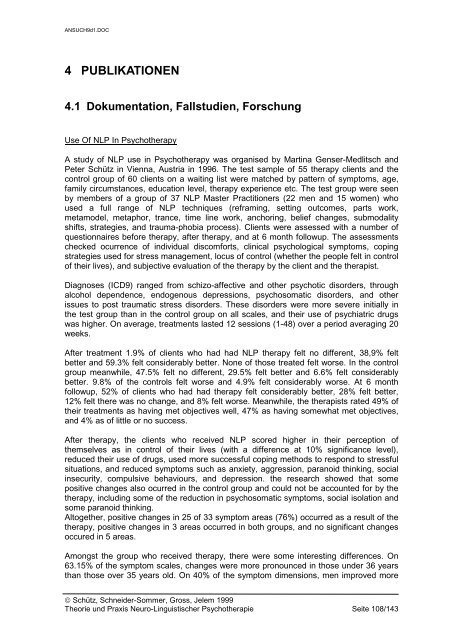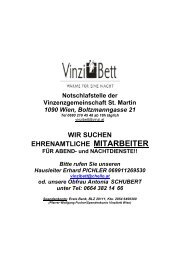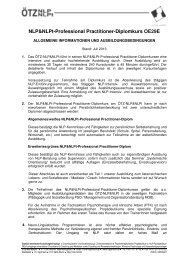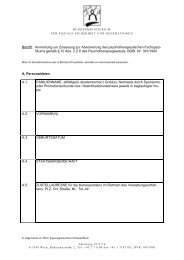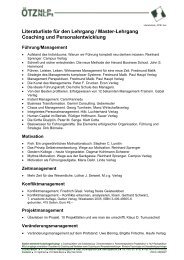AUSGANGSLAGE
AUSGANGSLAGE
AUSGANGSLAGE
Sie wollen auch ein ePaper? Erhöhen Sie die Reichweite Ihrer Titel.
YUMPU macht aus Druck-PDFs automatisch weboptimierte ePaper, die Google liebt.
ANSUCH9d1.DOC<br />
4 PUBLIKATIONEN<br />
4.1 Dokumentation, Fallstudien, Forschung<br />
Use Of NLP In Psychotherapy<br />
A study of NLP use in Psychotherapy was organised by Martina Genser-Medlitsch and<br />
Peter Schütz in Vienna, Austria in 1996. The test sample of 55 therapy clients and the<br />
control group of 60 clients on a waiting list were matched by pattern of symptoms, age,<br />
family circumstances, education level, therapy experience etc. The test group were seen<br />
by members of a group of 37 NLP Master Practitioners (22 men and 15 women) who<br />
used a full range of NLP techniques (reframing, setting outcomes, parts work,<br />
metamodel, metaphor, trance, time line work, anchoring, belief changes, submodality<br />
shifts, strategies, and trauma-phobia process). Clients were assessed with a number of<br />
questionnaires before therapy, after therapy, and at 6 month followup. The assessments<br />
checked ocurrence of individual discomforts, clinical psychological symptoms, coping<br />
strategies used for stress management, locus of control (whether the people felt in control<br />
of their lives), and subjective evaluation of the therapy by the client and the therapist.<br />
Diagnoses (ICD9) ranged from schizo-affective and other psychotic disorders, through<br />
alcohol dependence, endogenous depressions, psychosomatic disorders, and other<br />
issues to post traumatic stress disorders. These disorders were more severe initially in<br />
the test group than in the control group on all scales, and their use of psychiatric drugs<br />
was higher. On average, treatments lasted 12 sessions (1-48) over a period averaging 20<br />
weeks.<br />
After treatment 1.9% of clients who had had NLP therapy felt no different, 38,9% felt<br />
better and 59.3% felt considerably better. None of those treated felt worse. In the control<br />
group meanwhile, 47.5% felt no different, 29.5% felt better and 6.6% felt considerably<br />
better. 9.8% of the controls felt worse and 4.9% felt considerably worse. At 6 month<br />
followup, 52% of clients who had had therapy felt considerably better, 28% felt better,<br />
12% felt there was no change, and 8% felt worse. Meanwhile, the therapists rated 49% of<br />
their treatments as having met objectives well, 47% as having somewhat met objectives,<br />
and 4% as of little or no success.<br />
After therapy, the clients who received NLP scored higher in their perception of<br />
themselves as in control of their lives (with a difference at 10% significance level),<br />
reduced their use of drugs, used more successful coping methods to respond to stressful<br />
situations, and reduced symptoms such as anxiety, aggression, paranoid thinking, social<br />
insecurity, compulsive behaviours, and depression. the research showed that some<br />
positive changes also ocurred in the control group and could not be accounted for by the<br />
therapy, including some of the reduction in psychosomatic symptoms, social isolation and<br />
some paranoid thinking.<br />
Altogether, positive changes in 25 of 33 symptom areas (76%) occurred as a result of the<br />
therapy, positive changes in 3 areas occurred in both groups, and no significant changes<br />
occured in 5 areas.<br />
Amongst the group who received therapy, there were some interesting differences. On<br />
63.15% of the symptom scales, changes were more pronounced in those under 36 years<br />
than those over 35 years old. On 40% of the symptom dimensions, men improved more<br />
© Schütz, Schneider-Sommer, Gross, Jelem 1999<br />
Theorie und Praxis Neuro-Linguistischer Psychotherapie Seite 108/143


